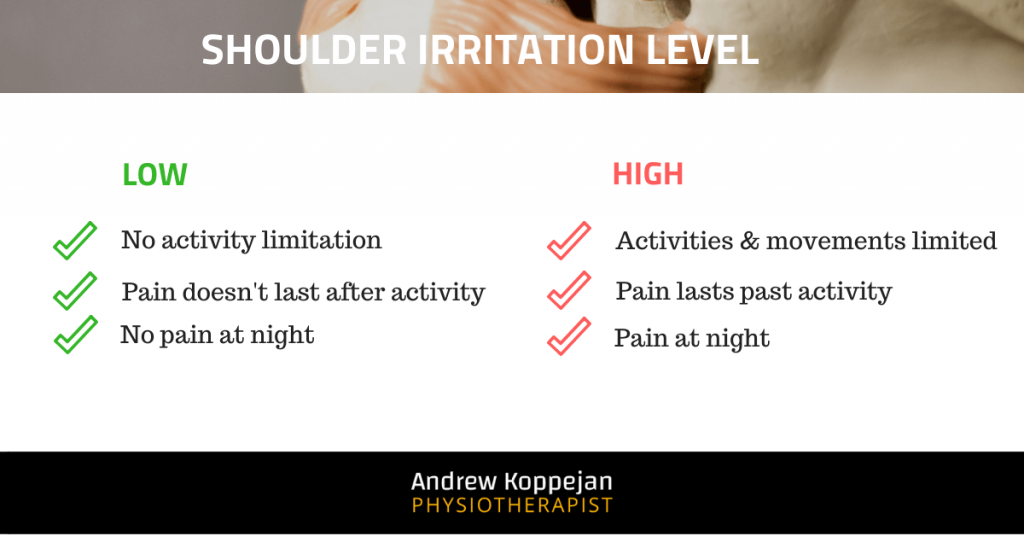Understanding when we should see someone for our shoulder aches & pains is an important topic. Far too often I see patients who have waited longer than they should because they thought things would get better on their own.
Having been in the trenches of helping patients from all walks of life and ages my recommendation is to treat shoulder issues early when the irritation level is low.
It’s best not to ignore what your shoulders are saying!
It’s far easier to resolve shoulder issues early when things aren’t as irritable than dealing with things that have become chronic.
Shoulder irritability can be rated on a scale of low to high on irritability. This graphic highlights some characteristics of different levels of irritability:

The bottom line is don’t ignore what your shoulders are saying. Take a look at these 5 questions below and if you answer ‘yes’ to any of them I’d recommend that you have a physiotherapist evaluate your shoulders.
Ask Yourself These 5 Questions:
#1: Are You Avoiding Certain Movements?
This is something that can happen without even noticing it, but it’s definitely something not to ignore. This could include any number of movements, but common movements include:
- Avoiding heavy lifting
- Avoiding putting things away in the overhead cupboard
- Changing the way you put on a shirt or bra
#2: Are You Avoiding Certain Activities?
This ties into the first question but looks more specifically at certain activities. When you have pain doing certain activities it’s an indicator that you should have your shoulder looked at.
For example, you enjoy riding your motorbike but your shoulder starts to really ache after you’ve been on it for a while. You start shortening the duration of your bike rides (or avoiding biking altogether) because of your shoulder pain.
#3 Do You Have Pain in your Shoulders at Night?
Night pain is a classic indicator of rotator cuff problems. Do you find yourself avoiding lying on that shoulder at night because of pain? Do you find waking up in the middle of the night because your shoulder is achey and bothersome?
#4: Do You Have a Difference in Range of Motion Between Shoulders?
Another important consideration and warning sign is when you notice that there’s a difference in the overall range of motion between your two shoulders. The difference may be something relating to joint stiffness, postural habits or a potential muscle imbalance. The key is to recognize that there is a difference between both shoulders and then taking action steps to fix the problem.
#5: Do You Notice a Loss of Strength in Your Shoulder?
Another important consideration is identifying if one shoulder is weaker than the other. Have you started to compensate with your other side because of a loss of strength?
Did You Answer Yes to Any of the Questions?
As I mentioned, it’s much easier to look at things when you are experiencing low irritability of symptoms as treatment is often much quicker, and getting back to regular activities is much easier. I’ve found that the longer a shoulder remains irritable, the longer it tends to take for things to settle down.
If you would like an assessment of your shoulders, don’t hesitate to give to book an assessment!




